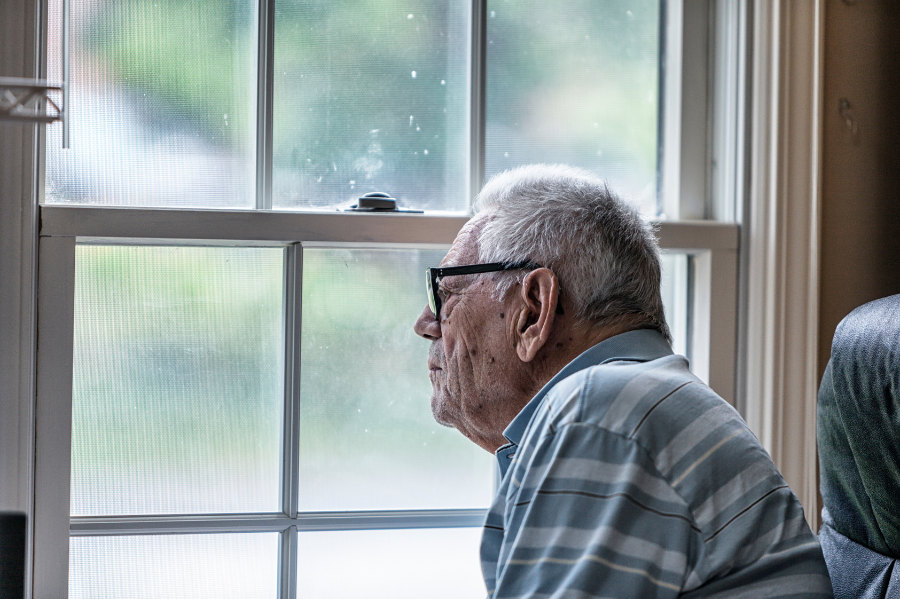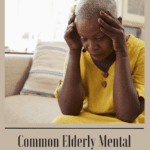
When talking about seniors, we often focus on physical health. Yet, mental health remains a significant area as well. After all, a person’s mental health affects their quality of life and poor mental health can lead to physical issues, especially as mental health impacts decisions.
Mental health can also be challenging, as there is no one-size-fits-all solution.
The continued growth of the senior population places considerable strain on current institutions and support systems, including those for mental health, making support still harder to find. That is, if you can even get seniors to talk about the issue at all.
To add to the woes, a large section of the society still believes that mental health symptoms in seniors are a part of the normal aging process. As such, many people do not think to consult a primary healthcare provider about symptoms, when the healthcare provider could have been invaluable in providing early detection and treatment.
Thankfully, the tide is changing, with many Americans taking steps to to improve their mental health.
What is Mental Health?
To put it simply, the term mental health refers to a person’s emotional and psychological well-being. Good mental health refers to people generally feeling positive about themselves, maintaining healthy relationships, being resilient, and adapting to change.
People with good mental health still experience bad days. Doing so is part of the human experience.
However, if your mental health is good, it’s easier to move past the difficult things. Bad days often won’t feel like a big deal and certainly won’t start a negative spiral.
Poor mental health is often associated with conditions like anxiety, depression, or PTSD. It can also present as strong mood swings or considerable sadness, even in the absence of any diagnosis. Other times, poor mental health could involve numbness, where emotional responses are lower than normal and joy is hard to find.
Not surprisingly, such issues lead to unhealthy behaviors. People in such situations may try to distract or numb themselves. Or, they may simply not be interested in healthy practices, like being social or exercising.
Warning Signs of Senior Mental Health Issues
While some people are overt about their mental health, many others don’t talk about it much.
There’s a generational factor too. Earlier generations were often taught not to express vulnerability and to be stoic, regardless of their struggles. While some have learned other approaches, many continue to approach mental health in this way.
As a result, caregivers may need to look for signs of mental health problems. These include the following.
- Have unexplained aches and pains
- Feeling sad and hopeless
- Anger and irritability
- Excessive smoking, drinking, or drug intake
- A change in sleeping and eating habits
- Talk of harming others or self
- Withdrawal from social contacts
- Mishandling finances
- Memory problems or mild cognitive impairment
- Dramatic mood changes
- A lack of engagement in life and activities the senior previously enjoyed
Sometimes the indications will be obvious, like a sudden withdrawal or strong emotions. But, this isn’t always the case. Changes can be more subtle instead, where the senior might experience a gradual decline over the course of months or even years.
What Causes Mental Health Issues?

Mental health issues and mental illness don’t come from a single cause. Instead, they’re associated with a combination of biological, environmental, psychological, and socioeconomic factors.
Factors that increase likelihood of mental health issues include:
- Genetic predisposition
- Childhood abuse or trauma
- Long-term substance abuse
- Brain injury
- Poor nutrition
- Significant life stressors, including death, divorce, changing jobs, and romantic breakups
- Feelings of inadequacy or low self esteem
- Isolation and loneliness
- Discrimination (which can include ageism) and stigma
- Poverty
- Unemployment
- Unstable living conditions
- Prolonged stress
These factors just impact risk. They don’t determine what will happen for an individual.
In particular, some people have many of the risk factors on this list, but have no significant mental health issues. Others might have just one or two, yet have a lifelong mental illness. These risk factors mean that seniors living in poverty, those who suffer abuse, and those with few social contacts are at increased risk of mental health issues.
Crucially, having poor mental health or a mental illness isn’t a sign of failure. People who struggle in these areas deserve compassion and support, not blame.
Senior-Specific Mental Health Risks
There are also some risks that are more notable in seniors.
The first is loss of purpose. Seniors often start to notice this after retirement, as they no longer have work to provide structure and direction to their weeks. To thrive, seniors need to look for new meaningful activities that can provide a similar sense of purpose.
Death of friends and loved ones is also common as people age. After all, many of the seniors friends will be aged 60 or above, often with health issues of their own.
Such loss of friends raises the risk of social isolation. Health issues can play a role too, especially if these impact mobility and make it harder for the senior to get out.
Common Mental Health Issues in Seniors
Mental health issues are common in seniors, with roughly 14% of seniors aged 60 and above living with some type of mental disorder. The effects of such issues can be dramatic, leading to decreased quality of life and even suicide in some cases.
Depression and anxiety are particularly common. However, other mental health issues can also be present, including:
- Bipolar disorder
- Personality disorder
- Obsessive compulsive disorder
- Schizophrenia
- Schizoaffective disorder
- Eating disorder
- Substance abuse disorder
Some mental health issues may develop for the first time late in the senior’s life, while others may have been present in some form for many years.
Treatments and Therapies for Mental Health Issues

Since each person is unique, treatment for elderly mental health issues is varied as well. It can also take time to find the best treatment approach, as people react differently to different courses of treatment.
Healthcare professionals often work with patients and family members, trying multiple combinations of therapeutic approaches until the right fit is found.
Some people with depression, for example, may try three or four different types of medication before finding a good fit. Others may see improvements from their first medication, while still others may not benefit at all from medication. Medication is also likely to be combined with other approaches, such as therapy and lifestyle changes.
The time it takes to find a good treatment can be frustrating for anyone struggling with their mental health. It may sometimes feel like they’re making no progress at all. This is why support from friends and family is so important. Such support can give the senior the strength to keep trying and help them to feel that they’re not alone in their journey.
The following approaches can all be used to help treat mental illness. They’re often used in combination with one another, as each approach has different strengths for improving elderly mental health issues.
Medications
Proper medication can play a role in treating several mental issues and conditions such as severe stress and insomnia. Be sure to consult your doctor to understand the medicines you are prescribed and take them as instructed.
Psychotherapy
Counseling or talk therapy can help in people to identify and change conflicting emotions and thoughts in a person. It may be done with any licensed mental health care professional.
Gold standard treatments like cognitive behavioral therapy (CBT) and dialectical behavioral therapy (DBT) have been proven in numerous studies to help with problems like stress, anxiety, overthinking, and emotional regulation. DBT is particularly useful for people who find it hard to deal with intense emotions and struggle with self-soothing in the face of triggers.
DBT is based on CBT, but it has a strong mindfulness core. Persons are taught to mindfully accept difficult emotions and “ride through” them, while keeping in mind that these emotions do not define them. DBT also proposes the use of the “Wise Mind”— a mindset that sits between the emotional mind and the reasoning mind.
DBT isn’t just centered on mindfulness, however. It also advocates change. The idea is to accept that life won’t always be easy, but you can take proactive steps to make it better. This can be achieved through self-care, fostering sound interpersonal relationships, and learning how to tolerate distress.
Both CBT and DBT are best carried out as part of professional therapy since a therapist can help patients identify the negative thoughts, emotions, and behaviors that may be standing in the way of their progress.
Many doctors recommend psychotherapy along with medication, as therapy addresses underlying emotional, cognitive, and behavioral patterns that medication doesn’t help with. Plus, the benefits of medication often only last as long as a person is taking the medication. Therapy works differently and aims to promote long-term change instead.
Online Therapy
This is the simplest way to access talk therapy from anywhere at any time from any device. Since many areas have few or no psychiatrists, online consultation is a good option, especially for seniors, who cannot avail of face-to-face therapy sessions due to health or logistics issues. Many of the top rated online therapy platforms all hire specialists who are trained in helping seniors.
Online therapy is typically less powerful than in-person therapy and it can take a while to connect with a good therapist. Still, it’s more affordable and accessible than in-person therapy, making it a good option in some situations.
Health Promotion
Anything that helps to improve physical health may be relevant for mental health as well. This includes activities like Nordic walking or yoga, which help to strengthen the body. There are plenty of programs out there that help to improve the health of seniors, including those run by local senior centers.
Social Engagement Activities
Organizations often conduct fun-filled engagement activities like online cooking, community-driven yoga, and the like. Such activities help seniors to enjoy life and also keep them socially connected. The social connection can be particularly powerful in helping with mental health.
Volunteering
Having a direction or sense of purpose often helps with mental health challenges, by giving people something outside of themselves to focus on. Volunteering is a useful tool here, as it also offers social connection.
First Steps to Find Help
Both physical and mental health are important components of overall health. Just as depression can aggravate other physical health problems, the presence of a chronic ailment can increase the risk of mental illness.
Where to begin will depend on the nature of the problem and the symptoms. More often than not, the best place to start is your local mental health care organization. Your family doctor could be a good person to talk to and get a referral of a good psychiatrist or psychologist to contact.
Peer support groups can also be an important addition to the help you get from health care providers. These groups focus on bringing together people with similar mental health issues or substance abuse conditions.
Having said that, though the primary care provider may initially treat the mental health disorder through medication, which may not be enough. Research has shown that the most effective treatment plan is a combination of therapy and medication, especially for anxiety and depression disorders.
It may take time to find good mental health solutions, especially for seniors who resist the idea of therapy or medication. Caregivers and family members may need to gently encourage them to find help, while also providing whatever support they can.
The goal isn’t to find the optimal solution right out of the gate. Instead, it’s best to just begin. To work on the process one step at a time. Improvements to the senior’s mental health may be gradual, but gradual changes aren’t a bad thing and can still be powerful.
What Can Caregivers Do?
For caregivers, the first step is often to have kind and gentle conversations. Remember, the senior might find it challenging or uncomfortable to talk about mental health.
You may also need to take things slowly. This could involve allowing the mental health conversation to naturally unfold over weeks and months – and not push the idea of a mental health professional too soon.
That said, it’s important to feel things out for yourself. The best approach will differ from situation to situation, so trust your instincts.
Feeling Overwhelmed?
Check out our Caregiving Consulting service for personalized support and guidance.


This article does an excellent job of explaining the complexities of mental health and highlighting the specific challenges seniors may face. It’s important to recognize the signs of mental health issues in older adults and provide them with the support and compassion they need.
I have a question. What are some effective strategies or activities that can help seniors maintain good mental health and a sense of purpose after retirement?
Meaningful activities are an important part of this process and we highlighted some in a previous post. While some seniors appear to do well simply living day-to-day, others need a larger sense of purpose or direction. There are plenty of options that don’t involve working, including volunteering, legacy projects, and writing. Some hobbies have this effect too, like painting, as the senior is creating something that might bring joy to others.